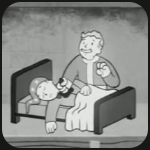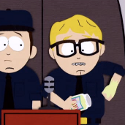|
Halloween Jack posted:A pet peeve of mine is OSR games that are almost literally just a reprint of the parts of AD&D1e that the author actually used, plus maybe some class abilities, new spells...the kind of thing that fans of most non-D&D games would put on a website or a forum for free, and never even consider trying to package as a game in its own right. There's a simple test, too. Download any of these Adventurers & Ampersands games, and find the description of the Fighting Man. If it gives them something like Cleave, or a choice of +1 to either melee or ranged weapons--y'know, featlike abilities ripped off from 3e--you know you've got something really sad. That's is why games like OSRIC and Swords & Wizardry are good. They are free, unless you want print copies. Then they're cheap. $26 for a 400 page hardcover book is a pretty good deal.
|
|
|
|

|
| # ? Apr 29, 2024 01:10 |
|
Try to make sense of this poo poo, I dare you: https://plus.google.com/116781946626781923658/posts/XqeEyZhU44U
|
|
|
|
Well, almost everybody who nerdraged about Ron Edwards' "brain damage" post were reading his comment completely out of context of the Forge discussion in which he made it. I'm not defending him, just saying that 95% of the response to it was "How dare he!" without understanding what he was really saying. I myself am not sure to exactly what games and game theory he was criticizing, so I don't support it or throw tantrums about it. So I don't know why he thinks this is worth the bother, but he's proposing to debate the point with anyone who can demonstrate that they actually understand the context of the conversation in which he said this inflammatory thing about gamers being brain-damaged. Edit: Also this quote:Ron, I'm saying this as an Internet Friend who admires and digs you and wishes you well. But I'm pretty sure that when your point needs thousands of words of explanation close to ten years later, it may be a situation where the choice of words and the available audience are badly mismatched. Halloween Jack fucked around with this message at 16:23 on Jan 16, 2015 |
|
|
|
Jack the Lad posted:Also, I really don't like 13th Age/Dungeon World freeform ritual magic where it's "you can do anything, but you have to gather ingredients/perform a ritual/pay a cost". It puts a level of narrative power that non-casters never get squarely in the caster's hands and in the process reduces other party members to the level of lab assistants. I'm not sure it's even better than the more rigidly defined spells you can cast as a standard action - despite how powerful some of those are - except in that it discourages you from doing it all the time. If it helps, in 13th Age, it pretty specifically says the ritual effect has to be related to a spell you can already cast, so it's a lot less open-ended than the Dungeon World version. Still potentially crazy powerful, though. And in Dungeon World, I think it's mitigated by the fact that everyone has a ton of narrative control, RAW, so it's not quite as tipped in the caster's favor there. That said, I imagine there's a reason why none of the popular unofficial spellcaster playbooks other than the Mage (which seems to be recommended less these days in favor of its more specific variants) have the Ritual move. All of the spellcaster playbooks I see recommended now, like the specific variant Mages (Clock Mage, Star Mage, etc.) and the Channeler, are much more limited in scope, probably for the better.
|
|
|
|
Jack the Lad posted:Also, I really don't like 13th Age/Dungeon World freeform ritual magic where it's "you can do anything, but you have to gather ingredients/perform a ritual/pay a cost". It puts a level of narrative power that non-casters never get squarely in the caster's hands and in the process reduces other party members to the level of lab assistants. I'm not sure it's even better than the more rigidly defined spells you can cast as a standard action - despite how powerful some of those are - except in that it discourages you from doing it all the time. As a counterpoint to this, in DW at least there's nothing stopping the Fighter or any of the other playbooks from picking Ritual with their multiclass options. The way the move itself is set up, if the group is finding that the Wizard is getting more screen time than the other players thanks to Ritual, the GM can just be like "Yeah, you're gonna need the Ranger's help on this one in a big way. Only somebody like him would even know where to start looking for that. How about it, Ranger? Where would you look?" But yes, I agree that gating one of the coolest abilities to a particular class is somewhat problematic, particularly when the other options don't get anything like it.
|
|
|
|
Halloween Jack posted:Well, almost everybody who nerdraged about Ron Edwards' "brain damage" post were reading his comment completely out of context of the Forge discussion in which he made it. I'm not defending him, just saying that 95% of the response to it was "How dare he!" without understanding what he was really saying. I myself am not sure to exactly what games and game theory he was criticizing, so I don't support it or throw tantrums about it.
|
|
|
|
Ron said some stuff that might've had a fine intended message, but he said it in a really loving dumb way. I really don't feel any sympathy for him on this one. poo poo was loving dumb and he's trying to act like it wasn't.
|
|
|
|
Guilty Spork posted:I was thinking more of the comments, which feature Pundit and Zak being how they are. Plague of Hats posted:Ron said some stuff that might've had a fine intended message, but he said it in a really loving dumb way. I really don't feel any sympathy for him on this one. poo poo was loving dumb and he's trying to act like it wasn't.
|
|
|
|
Yeah, no apologism for pundy and skeletor here but:Plague of Hats posted:Ron said some stuff that might've had a fine intended message, but he said it in a really loving dumb way. I really don't feel any sympathy for him on this one. poo poo was loving dumb and he's trying to act like it wasn't. This.
|
|
|
|
I didn't initially even read the comments, and it took longer to realize that "Kasimir Urbanski" is Tarnowski himself. Ron Edwards' persona--and please tell me if I'm reading him wrong--seems like a gift-wrapped present to Tarnowski's conspiracy theories. He wants to see collaborative storytelling methods evolve out of tabletop roleplaying; deeply affecting ones where "moral responsibility" is important. At the same time he praises "old-school" gaming, sometimes, which feeds into Tarnowski's belief that a secret hipster cult is trying to subvert control of D&D. He also likes using bold, inflammatory language, has a temper, and takes storytelling very very very seriously, which is why he was not wise enough not to step in the cowpie that Tarnowski apparently laid in front of him. If anyone can explain it to me, I'm still confused by what he means by protagonism and deprotagonisation. He vaguely refers to a lot of things and only rarely identifies specific concepts or games. Like: 1. Very early D&D where the player and the character weren't distinguished affected protagonism. 2. The attitude that the DM is God but that the players can play Mother-May-I with him to pull off a stunt that the rules don't cover. 3. The trend in the 80s(?) of games encouraging GM to be very strict and very punitive. 4. The 80s-90s trend of the GM as auteur director and the elevation of "story" in a way that boils down to railroading. 5. Games that specifically mark the PCs out as the protagonists and give them rules that enforce it. 6. Indie games that encourage sharing characters or acting as both actor and director. All these things affect protagonism, but not in the same way, and they certainly don't all stem from the same philosophy or attitude.
|
|
|
|
I see D&D "brain damage" (phrasing it like that is pretty offensive) all over the place when people have annoying discussions about what class or alignment some character in fiction or even real people would be.
|
|
|
|
It is offensive for a lot of reasons. To be fair, he "diagnosed" himself with it first and foremost, and said that Sorcerer was basically a striving to break away from it. A more polite way of putting it--at least, the form of it that I see most often, in myself and others--would be the virtual world fallacy, where you can only see stories, characters, and roleplaying in terms of an avatar inside a virtual reality. The rules must be physics, they cannot quantify any kind of meaning, and good roleplaying can only come from "immersing" yourself in your character's perspective.
|
|
|
|
Calling it a bad habit would have probably been more constructive on his part. Also lol at Zak bringing up the consultant thing as if that wasn't actually about his harassment of people he perceives as "enemies".
|
|
|
|
Huge swaths of grognards.txt are about people who're suffering brain damage from D&D. Edwards just had the bad judgement to say it out loud phrased in that exact manner and repeatedly digging it up.
|
|
|
|
Error 404 posted:
If he were smarter, I'd think it was some SEO obfuscation so anyone searching his name + "harassment" only gets his made-up story about the mean sex-negative jealous jerks something something 5e. Instead it's probably just his signature "spam lies until true" thing that seems to work for him. How is the brain damage thing even remotely controversial? I thought it was fairly established that bad elfgames make parsing good elfgames harder. moths fucked around with this message at 19:57 on Jan 16, 2015 |
|
|
|
gradenko_2000 posted:Huge swaths of grognards.txt are about people who're suffering brain damage from D&D. Edwards just had the bad judgement to say it out loud phrased in that exact manner and repeatedly digging it up. Wasn't the Brain Damage thing about White Wolf, though? I might be remembering wrong, but I think that it was specifically about how WoD builds up bad habits in people that make them worse at playing actual storygames, and how clearly when people have trouble figuring out what to do with Ron Edward's games it's due to brain damage on their part. MalcolmSheppard posted:RPGs need to explain how their systems create fiction. They don't need to be doctrinaire about it, but they can at least provide options and instruction on how to make that happen at your table, because the fiction machine element is at the heart of the play experience. 4e does more than none of this, but less than enough, though to be fair, after years of promoting rules mastery and a set way of thinking about this stuff in 3e, it was never going to be easy to win over some folks. Very much this. The mechanics of 4e aren't really any worse than 3e for storytelling, but there's something in the way it's explained that just does a way worse job of steering people towards fiction creating, even among people without any sort of pre-existing ideological attachment to d20.
|
|
|
|
Guilty Spork posted:Try to make sense of this poo poo, I dare you: Is it still a circle jerk if everybody is jerking themselves off?
|
|
|
|
We've all seen these situations before, but mine is a little bit weirder than most. Let me start from the beginning. First of all this player started out playing as a gnome wizard but switched to a dwarf artificer when the party's leader took a short hiatus. Later, after the party's original leader returned, the party's second controller quit playing, so Dennis, the murderer in question, returned to his role as the controller. Although he didn't enjoy playing a wizard and wanted to try his hand at the invoker. So we did a small retcon and remade him into an Invoker. I'm pretty sure that he used the character builder and didn't spend a lot of time building his character because at one point he wasn't aware that his character was a divine caster. He thought it was just a different flavor of wizard. I mentioned this to him right away so I know that he had some idea of what was up. I need to make a quick side note. The party's other controller actually started sharing DMing responsibilities with me and started his own story arc. I actually got to be a player for this particular game. So Dennis, the party, and myself were all deep in some underground city with a whole bunch of soldiers close behind us. The city was empty and unguarded. As we made our way into the town square we soon found ourselves surrounded on all sides by a huge crowd of women, children, the lame, and the elderly. They were mostly scared. Since the crowd was scared of us, I decided that the best way to deal with them was to try a little diplomacy to get them into let us pass. I failed my diplomacy check. So I figured that the best way to get another chance was to show them that we meant business. Since I used my action this round I looked to our party's controller to show a low damage show of force, just to spook them. I said "Use your Vangaurd's Lightning in front of the crowd." He later confessed to hearing, "Use your Vanguard's Lightning in the front of the crowd." Regardless, the DM declared that the people in the crowd were slain instantly. I looked at Dennis in amazement. "Dude, you are a good character and you worship Pelor? I didn't want to metagame, so shut my mouth and tried to imagine what my character would do in that situation. While he would object to the violence, he would also not let go of the opportunity that this attrocity just afforded him. So I grabbed my d20 and made an intimidate check, and I rolled another 1. The DM had an npc declare that they weren't going to let us come into their town and murder them and the crowd started to incircle us. I looked to the group and said what now? Most of us didn't know what to do, the DM pretty much told us that there were too many people to fight through, and that regardless of their physical situation as a whole crowd they could tear us to shreds. I looked at the rest of the party and asked if any of them had any ideas and Dennis was the only one who responded. Unfortunately, his response was another Vanguard's Lightning into the crowd. Which killed another 9 people automatically... After failing the social checks the DM decided that the situation was an unwinnable one and rescued us. Since this was his last game, he didn't bother worrying about what happened with Dennis. The next three games were my turn to DM and I spent 3 different games getting the players back home to the surface world. I used those games to make it clear that Dennis did something wrong, but I wasn't sure what kind of consequences to stick him with. I talked to the other DM about it and he doesn't even remember it. In fact he's planned out the next two games and he doesn't have room for it. Now its my turn again and I'm determined to do something. However, there has been another development. During my second to last session, my party's Leader quit again for good. Two of my players Dennis and another player decided to step up and fill the void by becoming hybrid Clerics, figuring that two hybrid clerics = one full cleric. So now Dennis is both a shamed Invoker & a shamed Cleric. In fact we both went in and retconned some backstory making him an invoker who was pulled into an order of clerics because of his natural gift. He doesn't know it yet but his powers are the direct result of Pelor intervening in his life during his infancy. Dennis' situation is a weird one for a few reasons: Dennis didn't fully understand his character when he commited his crime Dennis should have read his characters full discription, it was his responsibilty As the DM, he's used to me having a postion of authority over him. He probably believed he was just following orders. Dennis should realize that it's his responsibility to disobey an unlawful order. Even after his first mess up, he did it again. The crowd was surrounding us, and threatening our lives both indirectly and later directly. It was very close to self-defense. These people were helpless. So, where does the jury stand on Dennis' actions. Is he Guilty of 1st Degree Murder, 2nd Decree Murder, or Manslaughter? Was it Self Defense or Temporary Insanity? So, I'm not planning on taking away his powers but I do need to address the situation. I'm just not sure how to go about it. I'm thinking that since his powers are so special, he was being scryed upon by Church's Inquisitor, the man who discovered and trained him (what irony :P). Is this enough, should Pelor or one of his angels get involved? What about his alignment? Should I talk to him about switching gods? I should note that Dennis is very attached to Pelor and now has a full understanding of how his character should behave, even in a dire straights situation.
|
|
|
|
OtspIII posted:Wasn't the Brain Damage thing about White Wolf, though? I might be remembering wrong, but I think that it was specifically about how WoD builds up bad habits in people that make them worse at playing actual storygames, and how clearly when people have trouble figuring out what to do with Ron Edward's games it's due to brain damage on their part.
|
|
|
|
moths posted:How is the brain damage thing even remotely controversial? I thought it was fairly established that bad elfgames make parsing good elfgames harder. It probably has at least a little to do with him thinking that statutory rape is a useful analogy for those bad elfgames.
|
|
|
|
Oh good loving Christ.
|
|
|
|
That whole G+ thread is great  watching. Tarnowski, Zak, and Ron Edwards all trying to pwn each other in an endless ourobouros. Can you guess how many posts it takes before they start arguing over matters of pure semantics and the definition of words? It's almost certainly less than you think. watching. Tarnowski, Zak, and Ron Edwards all trying to pwn each other in an endless ourobouros. Can you guess how many posts it takes before they start arguing over matters of pure semantics and the definition of words? It's almost certainly less than you think.
|
|
|
|
I always figure if the argument doesn't start by defining a common axiomatic lexicon, then it's probably all bullshit anyway.
|
|
|
|
moths posted:
|
|
|
|
The word choice is offensive garbage, I mean is the concept controversial beyond that?
|
|
|
|
moths posted:The word choice is offensive garbage, I mean is the concept controversial beyond that?
|
|
|
|
MalcolmSheppard posted:I don't think the clarity was an issue. I think the lackadaisical way the game approached generating fiction with the rules was. I love 4e--it's the longest running game I've ever played in now--but man does it ever read like "Uh, some bullshit happens? With your sword maybe? Anyway 2W is the whole point and I've got SO many more of these things to write." For some folks this is a gateway to freedom, with reskinning and other fun stuff, but a lot of people want more flavour and more guidance on how game systems produce fiction. With regard to roles, a little paragraph of story-focused writing about being a martial defender would have been cool. Hell, maybe it's there but too boring to remember. MtG has tons of creativity and interesting flavor though. Have you actually looked through their settings? They focus outright on giving a setting specific themes to link the fluff and the mechanics, then givr each color more specific themes inside the block, and focus their design towards that. D&D doesn't lack anything because of in-house decisions by WotC - it lacks it because D&D is made by old D&D fans, for old D&D fans, and they don't want interesting flavor or creativity, they want the familiar. OtspIII posted:Wasn't the Brain Damage thing about White Wolf, though? I might be remembering wrong, but I think that it was specifically about how WoD builds up bad habits in people that make them worse at playing actual storygames, and how clearly when people have trouble figuring out what to do with Ron Edward's games it's due to brain damage on their part. Not to defend Ron, but a lot of D&D fans have been chomping at the bit to hate on him ever since he suggested D&D wasn't the end all be all, which included just flat out making up a lot of poo poo. The whole "IMMERSION" movement started as a reaction to him saying D&D was a game as a negative comment. For someone who did basically nothing more then post weird essays online and never interacted with the people who hated him, he's become hilariously despised, because this hobby is made of kindergartners.
|
|
|
|
So he could have just called it something pretentious like "Sandler Theory," how exclusively watching Adam Sandler movies tricks you into thinking they're the only good movies. Except he couldn't because that wouldn't be edgy.
|
|
|
|
One thing where you see the weird skewing thing that D&D does to people is reaction to games where one character gets a thing other characters don't (say, one character gets to be a noble, the others are their retinue, or Buffy the Vampire Slayer). D&D has taught people that this means automatically that the rest of the characters are getting hosed over and not getting what belongs to them, when it can be a pretty good storytelling mechanic.
|
|
|
|
moths posted:The word choice is offensive garbage, I mean is the concept controversial beyond that? You're also underestimating how angry people can get when they're talking to a stranger, online, and don't really understand each other's meaning. Imagine two gamers, Sam and Fred. They like the same games, and play and GM in a very similar way. But Sam agrees that RPGs are stories and Fred does not, and on that point they will argue on forums to the bitter end.
|
|
|
|
moths posted:So he could have just called it something pretentious like "Sandler Theory," how exclusively watching Adam Sandler movies tricks you into thinking they're the only good movies. I don't think Adam Sandler had gone full terrible by then, but yeah, pretty much. It just boils down to "these games build bad habits in how you approach games and poison the well" which is absolutely true. He just uses terrible hyperbole. EDIT: Halloween Jack posted:Remember that the idea that roleplaying = storytelling is infuriating to a lot of gamers (at least a lot of the people who talk about it online). So yeah, the idea that some games actually harm your outlook on life so that you are less able to create or even understand stories? That make some people mad. Did that happen before or after Edwards' thing though? I feel like a lot of hate towards stories was born from hate aimed at Edwards first and actual game or mechanical theory a very distant second. ProfessorCirno fucked around with this message at 22:31 on Jan 16, 2015 |
|
|
|
dnd-brain-damage.txt You are locking on to the specific using that to define how "samey" is not correct. I am pointing out that the generalities of activation and job system are the hallmark of the "samey" feel. A red button is a red button. Pushing it may launch a missile or open a garage. They are still similar red buttons. To be honest, I don't care how x interacts with y. If I can use a power 3 times a day, and so can every other character at the table, that is the "same" to me. I can readily agree that those abilities are different. That doesn't mean anything when we are using them all on a similar schedule. A "defender" fighter punishes targets for not attacking him. So does the defender paladin. Do you deny this is the case? HOW they do it, is not remotely relevant to my question, don't bother explaining. A "tank" is a "tank". The abilities activated to accomplish their goal are meaningless. Damage of equal amounts is damage. The type doesn't matter. a -2 penalty is a -2 penalty no matter how it is inflicted. Not being able to move because you're paralzed is fundamentally no different that not being able to move because your in a block of ice. We aren't discussing narrative. We are discussing general feel as is evidenced by the continuous use from several posters of the adjective "same/samey" I would say that you are seeing the trees, and not the forest in this analogy. I am focused on the feel of general play and mechanic usage (the forest). You are focused on what individual abilities do when triggered (the trees). I am in no way saying Class A is exactly like Class B. I am saying they "Feel" the same to me because usage of their abilities is the same in both cases. I am saying that playing a Tank feels the same no matter which tank I play. You are countering that their specific mechanics differentiate them. I agree with that. That doesn't mean they don't feel the same to me.
|
|
|
|
Kemper Boyd posted:One thing where you see the weird skewing thing that D&D does to people is reaction to games where one character gets a thing other characters don't (say, one character gets to be a noble, the others are their retinue, or Buffy the Vampire Slayer). D&D has taught people that this means automatically that the rest of the characters are getting hosed over and not getting what belongs to them, when it can be a pretty good storytelling mechanic. Except the whole 'I have wizard powers, you have to live in gritty realism' divide. They love that one.
|
|
|
|
ProfessorCirno posted:Did that happen before or after Edwards' thing though? I feel like a lot of hate towards stories was born from hate aimed at Edwards first and actual game or mechanical theory a very distant second. Also bear in mind how much anti-story whining has been for the specific purpose of crafting a logical proof that 4e isn't a roleplaying game. People actually embracing the idea that rules-as-physics and "immersion" are the only way to be really roleplaying, just so they can despise 4e. I don't think you could have "Dissociated Mechanics" arguments without the GNS debate, but I doubt Justin Alexander set out to flip Edwards the bird when he wrote that essay.
|
|
|
|
Kemper Boyd posted:One thing where you see the weird skewing thing that D&D does to people is reaction to games where one character gets a thing other characters don't (say, one character gets to be a noble, the others are their retinue, or Buffy the Vampire Slayer). D&D has taught people that this means automatically that the rest of the characters are getting hosed over and not getting what belongs to them, when it can be a pretty good storytelling mechanic. Not only is it a pretty good story mechanic, it's one that comes really naturally to you if you can get away from the D&D "bad habit". A lot of games include a phase in character generation where everyone creates some kind of bond with the other characters (Hx in Apocalypse World / aspects generation in most FATE based systems etc) and even when these prompt everyone to have some relation to everyone else, people still quickly flock to parties that make sense: A Hardholder and her gang, the Hocus and their cult, the Skinner and his retinue. The Captain, the crew and her cargo. The diplomat and his bodyguard. All center around one person, and then a lot of the fun comes from introducing odd triangles between PC's and NPC's and the way everyone interact with each other. Once you get used to that, D&D parties quickly start seeming like odd little communist social groups, where sometimes there even needs to be a debate as to who can speak with the NPCs.
|
|
|
|
From Tor's Appendix N Re-read, just linked in chat... quote:I really, really want to discuss this in more detail, but I'll just say that if you're going to throw Howard's stories under the "racist/sexist" bus, then you'll have to throw virtually every fantasy writer from the first half of the 20th century on the road too. I'd also say describing the story as trashy, or pulp in general as trash, even in a positive way, is sorely underselling its very extensive philosophical, historical, and mythic depth.
|
|
|
|
moths posted:So he could have just called it something pretentious like "Sandler Theory," how exclusively watching Adam Sandler movies tricks you into thinking they're the only good movies. Ron believes that certain games, which he talks about in general terms for a bit and then gets into Vampire, because he really despises White Wolf games, make it impossible for players to understand some of the basic structures of stories. Hell, he may even believe neural pruning makes this a physiological state. The primary problem is that Ron's understanding of stories ain't exactly Northrop Frye, which is why story gaming is peppered with all kinds of weird neologisms, like the protagonist's role getting defined by the player's freedom of action within the "premise" instead of centrality. People have different understandings of even the most fundamental elements of story, but to Ron certain forms of understanding are right, and others are "damaged." For example, over in a thread about this Ron links to there's lamenting about someone asking about demons and moral codes in Dogs in the Vineyard. What I find fascinating about this is that it resembles the critique of Hamlet the Tiv (an African cultural group) use in "Shakespeare in the Bush." (Read it at http://www.naturalhistorymag.com/picks-from-the-past/12476/shakespeare-in-the-bush ) In both cases, the analysis is materialistic, asking questions about what to do if you take the story's world at face value. The Tiv think Hamlet is absurd because they're not making the assumptions to get to the point of thinking about Hamlet's themes. The guy in the thread's doing pretty much the same thing--the idea that the demons aren't real and the ideas about Dogs that follow on don't reveal themselves because it doesn't meet that minimum level of authenticity. Based on Ron's criteria, he and the Tiv both suffer from brain damage. Ron's focus is on "story now." Real narratives spring from all kinds of sources and processes but to Ron, none of these are real stories unless they're generated by a direct interaction with the elements of stories as defined by his taxonomies. For instance, you might build a world with tensions between factions and kingdoms, and characters that interact with them, but to Ron that's relegated to the traditionally denigrated agenda of "Simulationism," and thinking that stories get made this way means there's probably something wrong with you. Unless you're generating conflict by asking a specific question of the setting, and unless you recognize that as the story process, welp, "brain damage." Now these ideas an arguments drift around a whole bunch because over time the Big Model has become so eccentric, mired in its own terminology and full of goalpost-shifting apologetics I do believe I could get an Operating Thetan out of rereading it all, but the basic thing is that Ron has a prescriptive ideology that promotes a certain outlook and dislikes the alternatives.
|
|
|
|
MalcolmSheppard posted:Ron believes that certain games, which he talks about in general terms for a bit and then gets into Vampire, because he really despises White Wolf games, make it impossible for players to understand some of the basic structures of stories. Hell, he may even believe neural pruning makes this a physiological state. The primary problem is that Ron's understanding of stories ain't exactly Northrop Frye, which is why story gaming is peppered with all kinds of weird neologisms, like the protagonist's role getting defined by the player's freedom of action within the "premise" instead of centrality. People have different understandings of even the most fundamental elements of story, but to Ron certain forms of understanding are right, and others are "damaged." So what you're saying is "The world is flat, propped on the backs of four elephants on top of fedoras all the way down"? 
|
|
|
|
Tarnowski on Ron:John Tarnowski posted:So please, cut the bullshit about "most people in the OSR would despise railroading"; of course they would. NO ONE IS loving TALKING ABOUT RAILROADING. I know that Railroading is your Reichstag Fire to give you the excuse to strip GMs of power. But GM Power does not equal Railroading. Tarnowski on Godwin.
|
|
|
|

|
| # ? Apr 29, 2024 01:10 |
|
MalcolmSheppard posted:Tarnowski on Ron: Oh man, I think I got blocked by Ron "doesn't know how to use G+ and doesn't care to learn" Edwards. He's still circling the drain with Pak and Zundit, but I garnered enough ill will for him to learn how to block someone. I'm so proud.
|
|
|

































